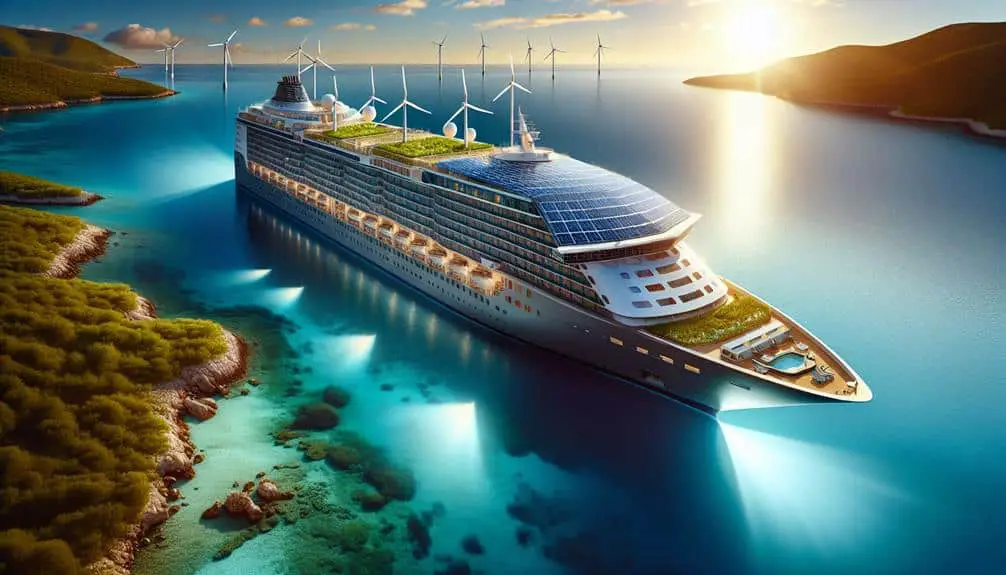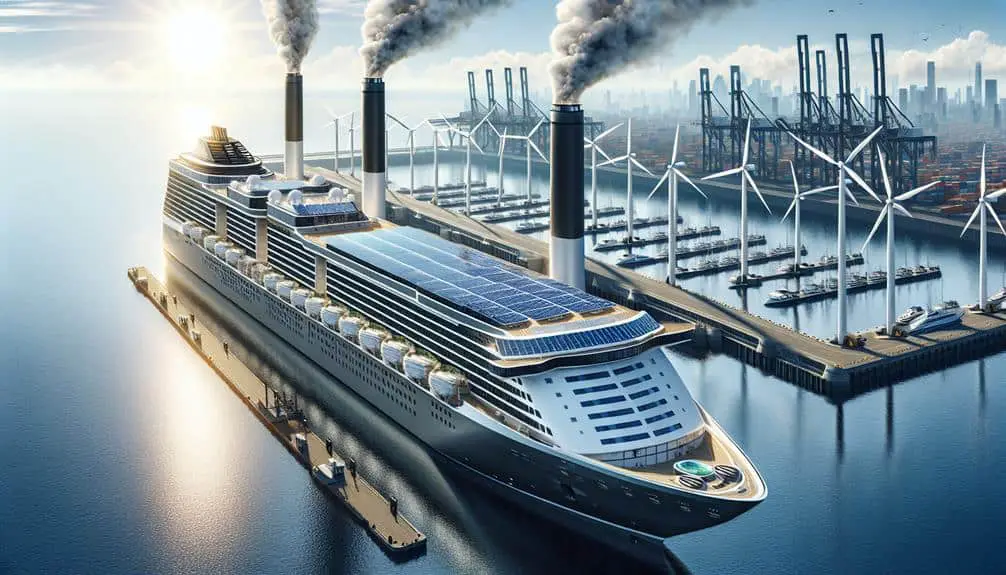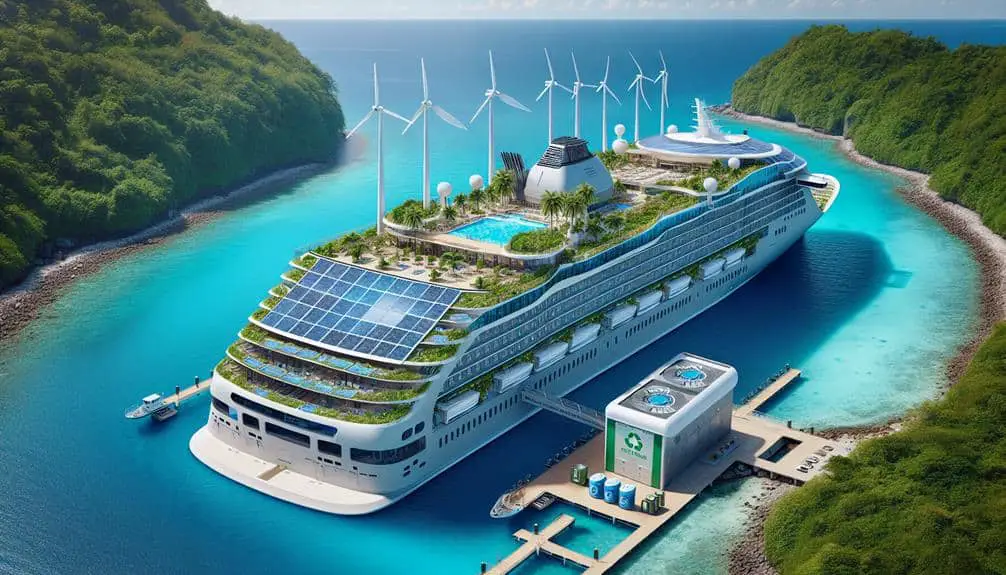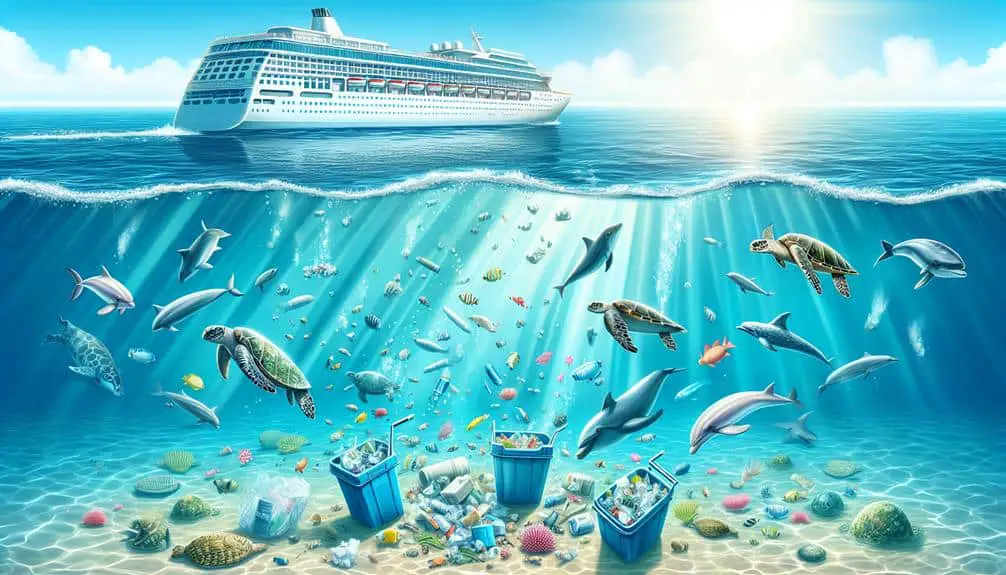Opting for Green Cruising promotes environmental sustainability by reducing carbon emissions using advanced propulsion and renewable energy. You benefit from energy-efficient technologies and marine conservation efforts, including coral reef restoration and plastic pollution reduction. The eco-conscious waste management practices, like composting and recycling, lead to a minimized carbon footprint. Ports embracing green initiatives contribute to sustainability with innovative infrastructure and energy-efficient lighting. These aspects collectively make Green Cruising a robust choice for eco-friendly travel. Additional details about the all-encompassing sustainability benefits are available within the researched information.
Key Points
- Reduced carbon emissions for cleaner air and a healthier planet.
- Energy-efficient technologies minimize environmental impact.
- Marine life conservation efforts promote biodiversity and ecosystem health.
- Sustainable waste management practices reduce pollution and waste.
- Eco-friendly port initiatives support sustainable tourism and harbor ecosystems.
Reduced Carbon Emissions
By utilizing advanced propulsion systems and optimizing fuel consumption, cruise lines have greatly reduced carbon emissions in recent years. The integration of renewable energy sources, such as solar panels and wind turbines, has played a crucial role in enhancing fuel efficiency and lowering greenhouse gas emissions. These technologies enable ships to harness natural resources to generate power, reducing their reliance on traditional fossil fuels.
Moreover, cruise lines have actively engaged in carbon offsetting programs and implemented emission reduction strategies to mitigate their environmental impact further. Through these initiatives, companies invest in projects that reduce carbon emissions, like reforestation or renewable energy projects, to balance out their own carbon footprint. By taking a proactive approach to sustainability, cruise lines aren't only reducing their operational emissions but also contributing positively to the environment.
Energy-Efficient Technologies
Energy-efficient technologies onboard cruise ships have revolutionized the industry's approach to sustainability, leading to important reductions in fuel consumption and environmental impact. The integration of renewable energy sources such as solar panels and wind turbines has played a vital role in enhancing fuel efficiency. Solar panels installed on the ship's deck harness sunlight to generate electricity, reducing the reliance on traditional fuel-powered generators. Similarly, wind turbines strategically positioned on the vessel capture wind energy, further supplementing the power needs of the ship. These innovations not only decrease fuel consumption but also contribute to lowering greenhouse gas emissions, aligning with the industry's commitment to environmental responsibility.
Furthermore, advancements in propulsion systems, like the adoption of more efficient engines and hull designs, have also greatly improved fuel efficiency. Modern cruise ships are equipped with state-of-the-art technologies that optimize energy usage, resulting in reduced environmental impact throughout their voyages. Embracing these energy-efficient technologies showcases the cruise industry's dedication to sustainable practices and sets a benchmark for eco-conscious travel.
Marine Life Conservation Efforts
Efforts to conserve marine life are important for maintaining the delicate balance of ocean ecosystems and safeguarding the biodiversity of our planet. Coral reef restoration projects play a significant role in reviving damaged reefs, providing habitats for a multitude of marine species. Marine sanctuaries act as protected areas, preserving biodiversity and allowing ecosystems to thrive without human interference.
However, challenges such as plastic pollution threaten marine life. Plastic waste harms sea turtles by ingestion or entanglement, leading to injuries and deaths. Conservation efforts focused on reducing plastic pollution are essential in safeguarding these majestic creatures.
To address these issues, green cruising emphasizes the importance of supporting initiatives that protect marine life. By choosing eco-friendly cruise options that prioritize sustainability and contribute to marine conservation projects, you actively participate in safeguarding our oceans. Your choices can make a significant impact on the preservation of marine ecosystems and the species that call them home.
Sustainable Waste Management Practices
The management of waste in a sustainable manner is imperative for reducing environmental impact and promoting ecosystem health.
Green cruising embraces sustainable waste management practices through the implementation of composting programs and recycling initiatives.
Composting programs onboard cruise ships involve converting organic waste into nutrient-rich compost that can be used to enrich soils or fertilize gardens, reducing the amount of waste sent to landfills.
Recycling initiatives focus on segregating waste materials such as plastics, paper, glass, and metals for proper recycling and disposal, minimizing the cruise ship's overall carbon footprint.
Eco-Friendly Port Initiatives
Implementing sustainable practices at ports is essential for reducing environmental impact and promoting greener maritime operations. Green infrastructure development plays a vital role in transforming ports into eco-friendly hubs. By investing in infrastructure such as shoreside power facilities and energy-efficient lighting, ports can greatly decrease their carbon footprint and reliance on fossil fuels. Community engagement is also key in fostering support for these initiatives, ensuring that local residents benefit from cleaner air and water.
Moreover, green technology innovation is driving positive change in port operations. From the use of electric cranes to the implementation of renewable energy sources like solar panels, ports are increasingly adopting eco-friendly technologies to minimize their environmental impact. Environmental partnerships between port authorities, shipping companies, and environmental organizations further enhance sustainability efforts. These collaborations facilitate knowledge sharing, funding opportunities, and the development of best practices for reducing emissions and promoting conservation. By embracing eco-friendly port initiatives, stakeholders can work together towards a more sustainable future for maritime transportation.
Frequently Asked Questions
How Do Green Cruises Impact Local Economies in the Destinations They Visit?
When you choose green cruises for your travels, you directly support local economies in the destinations they visit. By promoting sustainable tourism practices, these cruises help create jobs, preserve natural resources, and foster cultural exchange for a thriving community.
What Measures Are in Place to Ensure the Sustainability of Food and Beverages Served on Green Cruises?
To guarantee sustainability of food and beverages on green cruises, sourcing practices prioritize local, organic, and ethical suppliers. Waste management strategies include composting, recycling, and minimizing single-use plastics. These measures reduce environmental impact and support community resilience.
Are There Any Educational Programs or Initiatives on Board Green Cruises to Raise Awareness About Environmental Issues?
On green cruises, environmental education is a priority. Interactive workshops and programs raise awareness about environmental issues. Sustainable tourism principles guide community engagement. These initiatives aim to foster a deeper understanding of environmental sustainability among passengers.
How Do Green Cruises Handle Emergency Situations That May Impact the Environment, Such as Oil Spills or Accidents at Sea?
When emergencies strike, green cruises excel in environmental protection. Rigorous safety protocols guarantee swift emergency response to prevent or mitigate environmental impact. By prioritizing preparedness and sustainability, these cruises navigate challenges responsibly.
What Steps Are Taken to Reduce Noise Pollution From Cruise Ships and Its Potential Impact on Marine Life?
To reduce noise pollution from cruise ships and protect marine life, Green Cruising implements advanced technologies like sound-reducing propeller designs and route planning to minimize disturbance to habitats. Emissions are lowered, and habitats are safeguarded.




